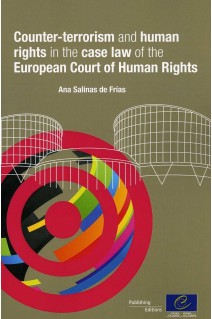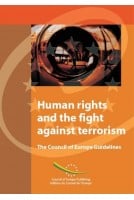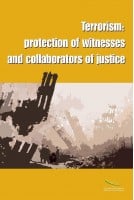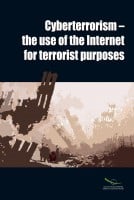

Human rights and the fight against terrorism - The Council of Europe... (2005)
- Exclusivité web !


Terrorism has become one of the major threats facing both states and the international community, in particular after the terrorist attacks in the United States, Madrid and London, which revealed a whole new scale and dimension of the phenomenon. An effective response is absolutely necessary; this response, however, cannot undermine democracy, human rights, the rule of law or the supreme values inherent to these principles.There is no universally agreed definition of "terrorism", nor is there an international Jurisdiction before which the perpetrators of terrorist crimes can be brought to account. The European Court of Human Rights is the first international Jurisdiction to deal with such a phenomenon. For many decades and through more than four hundred cases, it has elaborated a clear, integrated and articulated body of case law on responses to terrorism from a human rights and rule of law perspective. Thus, this is a handbook on counter-terrorism with a special focus on due respect for human rights and rule of law.This book compiles the doctrine laid down by the European Court of Human Rights in this field with a view to facilitating the task of adjudicators, legal officers, lawyers, international IGOs, NGOs, policy makers, researchers, victims and all those committed to fighting this scourge. The book presents a careful analysis of this body of case law and the general principles applicable to the fight against terrorism resulting from each particular case. It also includes a compendium of the main cases dealt with by the Strasbourg Court in this field and will prove to be a most useful guiding tool in the sensitive area of counter-terrorism and human rights.
Foreword
Part I – Preliminary study on counter-terrorism and human rights in the case law of the European Court of Human Rights
Introduction
1. Terrorism and the right to life
1.1. Nature, main features and substantive content of the right to life
1.2. The procedural limb of Article 2
2. The prohibition of torture
2.1. Absolute nature of the prohibition
2.2. Difference between torture and inhuman or degrading treatment
2.3. Substantive limb of Article 3
2.4. Procedural limb of Article 3
2.5. New forms of violation of Article 3
3. The right to liberty and security
3.1. Possible reasons for detention in relation to the fight against terrorism
3.1.1. Imprisonment following conviction by a competent court
3.1.2. Detention of reasonable suspicion of a terrorist act
3.1.3. Detention for unlawful entry, deportation or extradition
3.2. Conditions of detention in terrorism cases
3.2.1. Reasons for detention
3.2.2. Delays in bringing terrorism suspects to court
3.2.3. Detention must be properly authorised
3.2.4. Justifying pre-trial detention
3.2.5. Habeas corpus
3.2.6. Legal representation
3.3. Asylum, refoulement, expulsion and deportation in terrorism cases
3.3. Detention of alien suspected terrorists
3.3.2. Guarantees offered by the receiving state concerning potential treatment contrary to Article 3 ECHR
3.4. Terrorism and detention with a view to extradition
4. The right to a fair trial
4.1. The right to a hearing within a reasonable time by a tribunal
4.2. The right to a hearing by an independent and impartial tribunal established by law
4.3. Presumption of innocence
4.4. The right to remain silent and not to incriminate oneself
4.5. The right to have adequate time and facilities to prepare one’s defence and the right to defend oneself personally or through legal assistance
4.6. The right to a fair and public hearing
4.7. The relation between Articles 6 and 13 of the European Convention on Human Rights: the right to an effective remedy
5. Nullum crimen, nulla peona sine lege
5.1. The terrorist offence and its punishment should be defined in the law in clear terms
5.2. Non-retroactivity of the criminal law
6. The right to private and family life
6.1. Limitation of rights enshrined in Article 8
6.1.1. Possibility of access to a detained person
6.1.2. Privacy of correspondence between a detainee and his/her lawyer in terrorism-related cases
6.1.3. Secret surveillance
6.1.4. Personal integrity
6.1.5. Home searches
6.1.6. Interference with the right to family life from immigration decisions, expulsion or refoulement of an individual suspected of terrorist activities
6.2. Deprivation of rights enshrined in Article 8 of the Convention
7. Freedom of expression
7.1. Hate speech
7.2. Relevance of freedom of expression for politicians
7.3. Freedom of the press
8. Freedom of assembly and association, and the right to stand for election
8.1. Freedom of association
8.2. The right to stand for election
9. Concluding remarks
Bibliography
Part II – A selection of terrorism-related cases heard by the European Court of Human Rights
Selected cases
Appendix 1 – Index of cited cases in alphabetical order
Decisions
Appendix 2 – Index of cited cases in chronological order
Appendix 3 – Index of summarised cases in alphabetical order










Terrorism has become one of the major threats facing both states and the international community, in particular after the terrorist attacks in the United States, Madrid and London, which revealed a whole new scale and dimension of the phenomenon. An effective response is absolutely necessary; this response, however, cannot undermine democracy, human rights, the rule of law or the supreme values inherent to these principles.There is no universally agreed definition of "terrorism", nor is there an international Jurisdiction before which the perpetrators of terrorist crimes can be brought to account. The European Court of Human Rights is the first international Jurisdiction to deal with such a phenomenon. For many decades and through more than four hundred cases, it has elaborated a clear, integrated and articulated body of case law on responses to terrorism from a human rights and rule of law perspective. Thus, this is a handbook on counter-terrorism with a special focus on due respect for human rights and rule of law.This book compiles the doctrine laid down by the European Court of Human Rights in this field with a view to facilitating the task of adjudicators, legal officers, lawyers, international IGOs, NGOs, policy makers, researchers, victims and all those committed to fighting this scourge. The book presents a careful analysis of this body of case law and the general principles applicable to the fight against terrorism resulting from each particular case. It also includes a compendium of the main cases dealt with by the Strasbourg Court in this field and will prove to be a most useful guiding tool in the sensitive area of counter-terrorism and human rights.
Attention, en vertu de nos conditions générales de vente, l'achat des PDF/epub est réservé aux particuliers.
